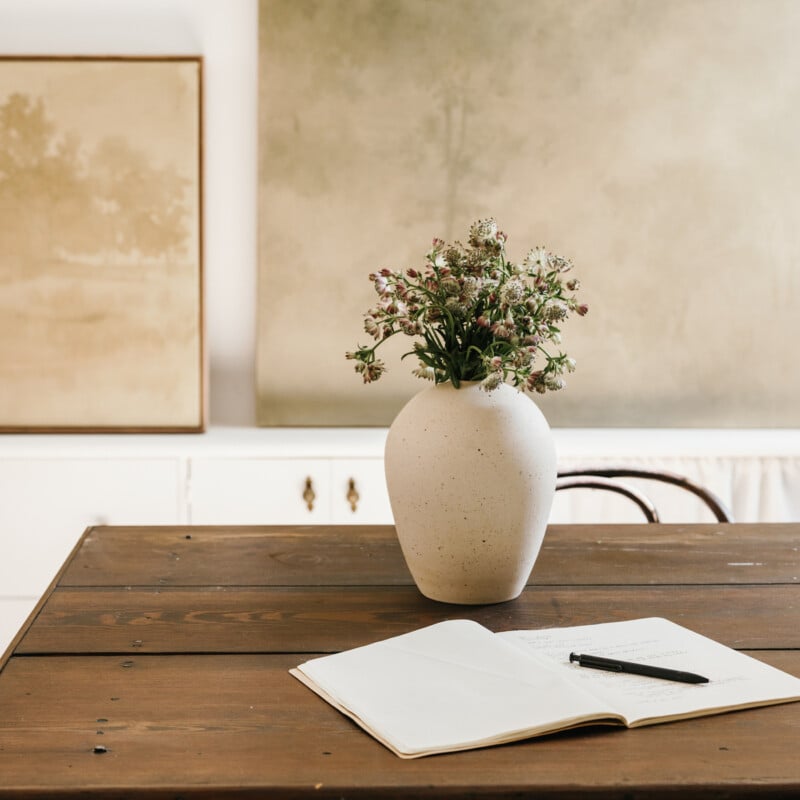I’ve always had a funny relationship with discipline. I’ll wake up at 6 a.m. for a workout five days a week, but meditation? I’ve never lasted more than three days in a row. I can go cold turkey from coffee for a month (without even realizing it), but an hour doesn’t go by without me craving ice cream—or doughnuts, or cake. I swear I’m 30 and not 13. These endless contradictions perfectly tee up my relationship with morning pages.
Popularized by Julia Cameron in The Artist’s Way, the practice is simple: every morning, you write three pages of stream-of-consciousness thoughts by hand. No editing, no revising, no worrying if it’s profound or even coherent. It’s a daily ritual designed to clear the mental clutter, connect you to your creative core, and remind you that sometimes, what’s hiding beneath the noise just needs a little space to be heard.
Every fall, as the mornings grow quieter and the light turns soft, I come back to this practice. It’s my seasonal reset—less about productivity, more about presence. Some days my pages are messy, filled with half-formed ideas and grocery lists. Other days, they surprise me with clarity. But always, they bring me back to myself. They’re a reminder that creativity doesn’t arrive fully formed. It shows up when we do.


What Are Morning Pages (And Why They Work)
At their core, Morning Pages are a simple daily ritual: three handwritten pages, first thing in the morning, filled with whatever’s on your mind. No editing, no rereading, no trying to make it sound good. It’s a stream of consciousness—part brain dump, part meditation—that clears space before the world starts asking things of you.
The beauty lies in its simplicity. When you write without expectation, you bypass the inner critic and make room for honesty. Thoughts you didn’t know were waiting for you start to surface. The anxiety that hums in the background quiets. You start to see patterns—what’s energizing you, what’s draining you, and where your attention keeps returning.
Over time, it becomes less about writing and more about returning to yourself. Like a morning walk or a strong cup of coffee, the act itself wakes something up inside you. It’s not about producing; it’s about clearing the way. And the more space you create, the more your creativity—and your clarity—begin to flow.
When you write without expectation, you bypass the inner critic and make room for honesty.
Why Fall Feels Like the Perfect Time to Begin Again
Every September, I find myself craving quiet. The pace of summer slows, the days feel softer, and I start longing for something grounding—something that helps me listen inward again. That’s when I return to my Morning Pages.
There’s something about the season that makes reflection feel more natural. The ritual of putting pen to paper mirrors what’s happening outside: the shedding, the clearing, the making space. It’s a small, daily act that reminds me to pause before rushing forward. Less about discipline, more about devotion.
When I flip through old notebooks, I can see the rhythm of my own growth across the years. The pages that once held uncertainty now hold gratitude. The fears that felt so loud have quieted. It’s proof that transformation rarely looks like change in the moment—it looks like showing up, word by word, even when nothing feels profound.
How to Start a Morning Pages Practice (and Actually Stick With It)
Morning Pages sound simple—and they are—but simplicity doesn’t always mean easy. The hardest part is often just starting. Here’s how I’ve learned to make the practice feel inviting instead of intimidating.
1. Make it the first thing you do
Morning Pages work best before your mind fills with noise. I keep my notebook and pen on my nightstand so they’re the first thing I see when I wake up. Some mornings, I write in bed. Others, I sit at the kitchen table with my coffee (on the odd week my subconscious hasn’t chosen to go without). The goal isn’t perfection—it’s consistency.
2. Don’t overthink the writing
These pages aren’t meant to be polished or profound. They’re where you unload the mental clutter—the to-do lists, the frustrations, the random thoughts. Think of it as clearing out your inbox before the day begins. Once that noise is out of your head, what remains is clarity.
3. Let the ritual be flexible
While Julia Cameron suggests three full pages, I’ve learned to let the structure bend with my life. Some mornings, I fill one while on other days I find myself able to write without end. The key is to keep showing up. It’s the act of returning, not the word count, that creates momentum.
4. Protect the privacy of your pages
Part of what makes Morning Pages powerful is knowing no one else will ever read them. It’s an honest space—your raw thoughts, fears, and hopes without filter. Don’t reread them right away. Let them do their quiet work first.
5. Treat it as a moment of presence
Light a candle. Pour your coffee. Let it feel like a small luxury, not another task. When you frame writing as an act of care rather than obligation, it transforms from one more “should” into something sacred.
Try this: for one week, commit to writing for 10 minutes every morning. Don’t worry about what comes out. Just pay attention to how it changes your energy throughout the day. Chances are, you’ll start to crave it—not for what you produce, but for how it makes you feel.
What Morning Pages Have Taught Me
When I reflect on my writing, it’s like opening a time capsule of who I was—and who I was becoming. There are seasons where every entry reads like a list of things I wanted to change, and others where gratitude spills across the page. But what always stands out is this: even on the days that felt uncertain or stuck, I kept showing up. And somehow, that was enough.
Morning Pages have taught me that clarity doesn’t arrive all at once. It unfolds quietly, word by word. It’s in the moment you realize the thing that’s been weighing on you doesn’t hold the same power it once did. It’s in the small sparks of insight that guide you toward what feels right, even when you don’t yet have a plan for how to get there.
Mostly, though, this practice has taught me to be where I am now. It’s a way of noticing—what I’m craving, what I’m avoiding, what’s beginning to take root. Writing each morning reminds me that self-awareness isn’t found in grand revelations, but in the simple act of paying attention. And in a world that moves fast and demands more, that kind of noticing feels like the truest form of peace.






